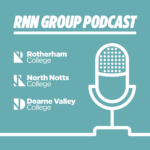Spotlight on… Computing and Digital Department
Are you pragmatic, goal oriented, innovative, and like to keep learning? Then you could play an active role in shaping the future of the world by choosing a career in computing.
Whether you’re interested in the technical side of technology or have the creativity needed to enhance cyberspace, dial up your skills and knowledge by studying a degree or higher education course at University Centre Rotherham.
Read on to find out how the computing and digital department at University Centre Rotherham (UCR) can help you achieve the qualifications needed to make it in the tech world.
What is a career in computing and digital?
Working in computing offers one of the most future-proof career opportunities. It’s flexible, fast-growing, with a far-reaching impact.
There aren’t many aspects of the world that don’t use technology. It’s become an integral part of daily life, from banking, energy, education and healthcare to media, manufacturing, retail and travel.
This in turn has created an increasing number of job roles. There were almost one million IT jobs advertised in the UK last year. But demand for skilled workers is higher than supply.
Due to this, salaries are usually high. According to research by the Department of Culture, Media and Sport, jobs that require digital skills are around 29% higher than those that don’t. In monetary terms, this could be an extra £8,300 per year.
But a career in computing also requires you to be ready for continuous learning. The expertise you have can quickly become obsolete as technology continues to evolve.
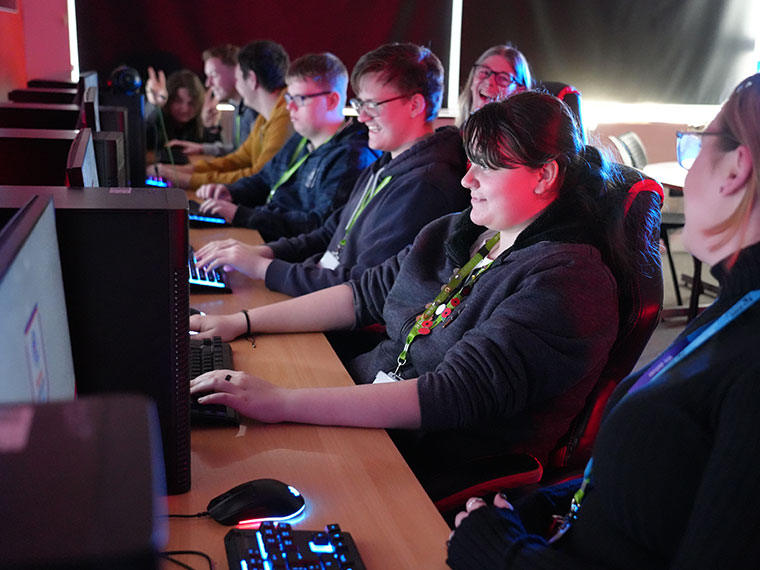
Where could I work?
Gone are the days when IT teams were not too dissimilar from the IT Crowd. Your stereotypically socially awkward tech geeks confined to a dusty back office somewhere, only on hand to unjam the printer or reboot someone’s PC whenever anything went wrong.
Since the Covid pandemic, digital transformation has been adopted much quicker. Businesses across almost every industry have integrated technology into their way of working to keep up with the future of work.
AI has revolutionised various sectors. Software solutions have streamlined processes. Cyber security is crucial to protect sensitive information. And data analysis helps businesses understand performance, optimise processes and make data-driven decisions.
In the UK, more than 1.7 million people are employed in a computing, IT or digital role.
These are generally split into three areas:
- Technical roles:
Software developer, network technician, cloud engineer, UX designer, data analyst, cyber security officer, game developer - Business roles:
IT project manager, digital marketing, IT salesperson - Creative roles:
Web designer, game designer, app designer, UI designer, content creator
Graduates from our computing courses have gone on to work in various roles within different sectors.
Some work in technical support roles such as network engineers or technical support specialists helping with IT infrastructure. Some have gone into cloud technology services as ISP engineers. Others are working as programmers contributing to software development and system integration in various industries. And some have gone on to teach computing to the next generation of learners, both at RNN Group and other education providers locally.
What computing and digital courses could I study at University Centre Rotherham?
At RNN Group, we offer two digital pathways: one for students interested in computer science, and one for students interested in computer gaming.
Computer science pathway
These courses have been designed around the growing demand in fields like networking, cloud computing, technical support, and programming.
BSc in Computing and Systems Development
This is a three-year degree programme accredited by the University of Hull. The degree course is full-time, but there is also the option to study part-time over a period of six years.
If you’re interested in a career in AI, cloud computing and cybersecurity, the degree course will provide you with the following:
- The first year covers areas like programming, web design, UI design and business system modelling.
- From the second year, you’ll choose one of three specialism pathways: networking, software development or general.
- The networking pathway includes system security, computer communications, networks, cyber security and cloud software.
- The software development pathway includes web and mobile app development, data structures, algorithms, and intelligent systems.
- The general pathway is a mix of both the above, looking at communication and networks, data structures, algorithms, intelligent systems and cloud computing.
Digital HTQs
These higher technical qualifications are two-year courses that result in a level 4 qualification.
They’re a good option for people who are unsure whether they can commit to a studying full time for three years on the degree course, but would like to enhance their knowledge. After finishing the HTQ, there is the opportunity to advance to further study like a degree or higher-level apprenticeship.
HTQs have been developed in partnership with employers, so are heavily focused on the skills that businesses are seeking when recruiting new staff.
At University Centre Rotherham we currently offer two digital HTQs:
HTQ in Data Analysis
This option looks at data science, summarising data, programming language, and virtualisation.
HTQ in Cyber Security
This option looks at network security, ethical hacking, incident response, and information reassurance.
Gaming pathway
These courses have been designed to support an increasing number of young people who aspire to work in the video gaming industry.
Foundation Degree in Games Design
This is a two-year course accredited by Sheffield Hallam University. It’s a level 5 course equivalent to the first two-years of a full Bachelor degree.
In the first year, modules cover games design theory, games mechanics, visual concepts and creating 3D environments for games design.
The second year looks more closely at advanced gameplay development, 3D character modelling, animation techniques, sound design, and human computer interfaces. There is also a group project.
HNC in Esports
This course takes place at our sister campus, Dearne Valley College, which has dedicated esports facilities including VR and shoutcasting suites.
The HNC is a level 4 course that covers the fundamental aspects of the esport ecosystem including skills and tactics analysis, event planning, branding and sponsorship, governance and legislation, and entrepreneurial opportunities.
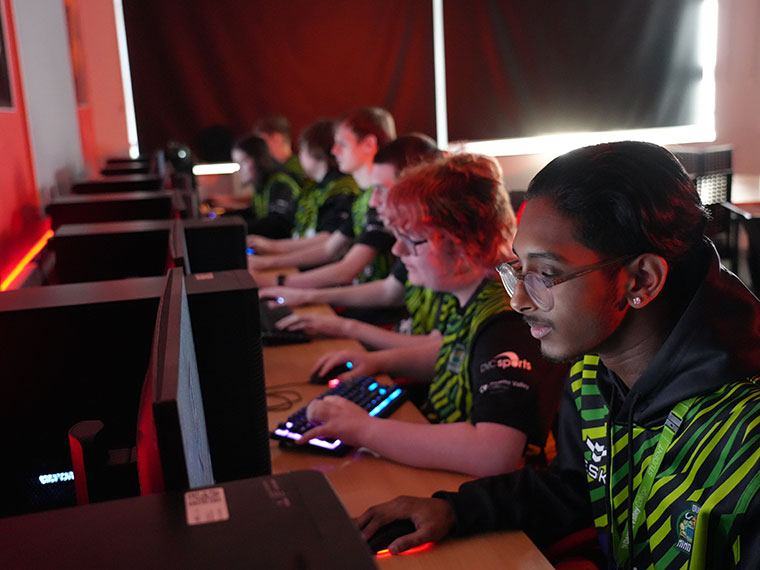
Why choose University Centre Rotherham?
Facilities, teaching and accessibility are three of the biggest factors that influence our HE learners here at University Centre Rotherham.
We have invested heavily in digital facilities over the last 12 months across the RNN Group to give our learners the hands-on experience needed to complement their theoretical studies.
There is a new digital suite in the Clifton Building equipped with high-performance computing labs, cloud-based resources, and dedicated cybersecurity infrastructure for practical learning.
Our HE students on both the degree course and HTQs have access to modern software tools used in industry, such as virtualistion software, networking hardware from Cisco, and AI development environments.
Over at Dearne Valley College, Rotherham College and North Notts College, where the Esports and games design courses take place, there are dedicated spaces for both game development and competitive gaming.
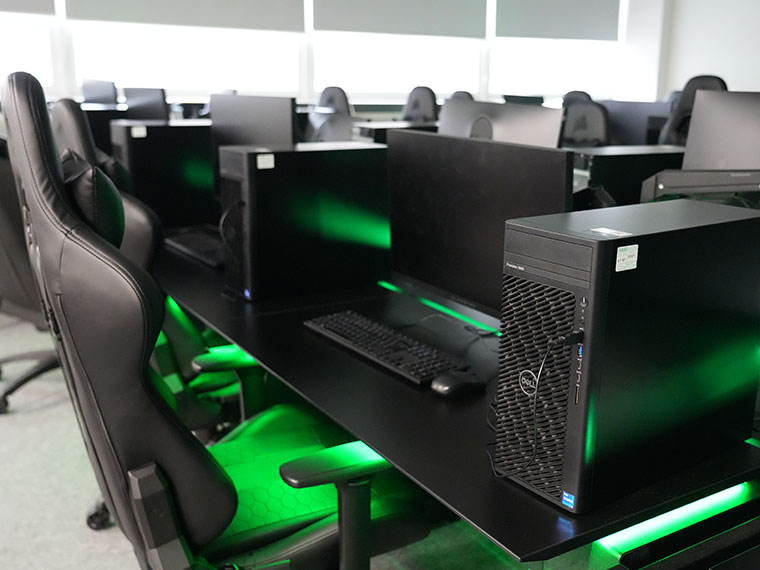
These state-of-the-art facilities have high-end gaming PCs, advanced graphics software, and motion-capture equipment to ensure students have the tools to work on their projects and participate in esports events.
There are also collaboration spaces to enhance team-based work and creative development.
In more recent years, the computing courses have attracted a growing number of female students who are looking at careers in areas like programming and cyber security. We actively encourage diversity and inclusivity through initiatives that aim to support women in STEM.
The computing courses are taught by staff who have valuable industry experience and extensive knowledge in areas like machine learning, ethical hacking, cloud architecture, and data analytics.
This enables them to connect academic theory with practical, real-world applications.
The department is led by Dr Eiman Aeiad and Dr Honour Nwagwu who both bring extensive expertise in NLP, AI, and data analytics. Darren Bristow leads the networking, cloud computing and cyber security modules and has taught at RNN Group for over 20 years.
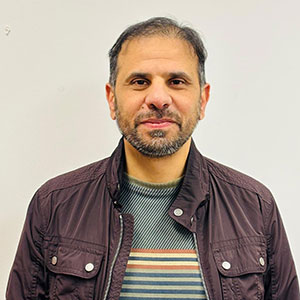
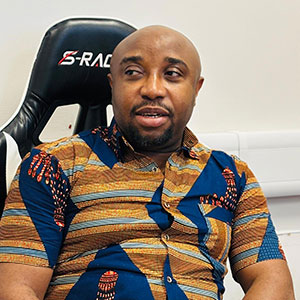
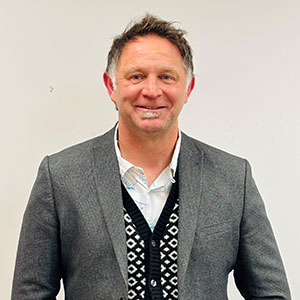
As well as teaching you all the skills you need for a career in computing, our lecturers get to get to know each learner by their name, understand their individual ambitions and goals, and are able to give them the one-to-one support they need to get there.
If you’re from Rotherham or South Yorkshire and want to stay at home while you study, University Centre Rotherham could be the place for you. You’ll have all the usual benefits of being a uni student – societies, student discounts, student loan funding, graduation – but can save on your living costs by doing a degree on your doorstep.
Plus, our course fees are less than most other universities. The BSc degree costs £6,900 a year, compared to the national average of £9,250. And as most students live at home, they save on student halls rent and additional living costs.
Real stories from our degree students
Muhammad
After studying IT at A-Level, Muhammad enrolled on the computing and systems development degree course at University Centre Rotherham to pursue his interest in computing. He says:
“UCR has been a breath of fresh air. I prefer assignments over exams because I’ve always found exams challenging, but UCR’s emphasis on assignments and coursework throughout the programme really appealed to me. This allowed me to excel without the pressure of exams.
“The small class sizes provided such a supportive learning environment for me. This has given me the opportunity to connect with my tutors and receive the best support when needed. Unlike many other universities, I get as much one-to-one time as I need to ensure I make the most of my course. For many learners in other universities, I have heard that you have to book two to three weeks in advance to see your tutor individually!”
James
James progressed from our further education provision at Rotherham College onto the degree course at University Centre Rotherham to pursue a career in digital marketing.
“Because I’ve had the opportunity to focus my studies on learning more about different forms of online advertising, predicting trends and augmented reality, I’ve decided to dedicate my dissertation to how research on these topics can be used by companies to market products.
“This kind of invaluable experience I would not have been able to get without the great facilities available on campus as well as tutor availability that have supported me from Level 3 to Level 6.”
Useful links
Computing and digital courses at University Centre Rotherham
Computing and digital courses at our College campuses
Games animation courses at our College campuses












